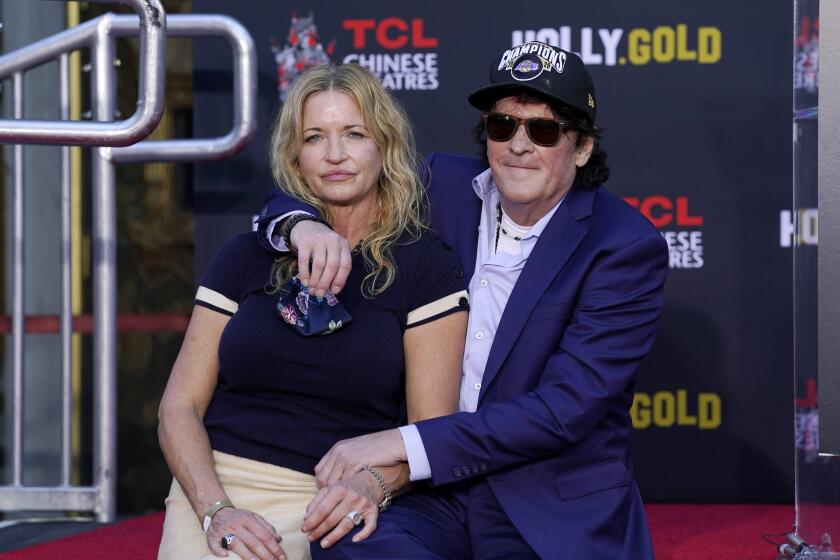In the equation
Michael Shannon does not seem to belong in a conference room.
Comfy gray Old Globe sweat shirt, hair that’s either mad-scientist wild or Romantic-poet chic, squinting to find the words, speaking softly, calmly, articulately. Maybe he’s the expert they bring in to explain why a company’s imploding and there will be no survivors.
But here he is, in just such a chamber on the Paramount Studios lot, a thoughtful Chicago stage veteran with a growing list of impressive film credits, promoting the award-season contender “Revolutionary Road,” in which he appears with Kate Winslet, Leonardo DiCaprio and Kathy Bates. He admits he has never been in the crush of publicity for a film like this before -- and he’s enjoying it, especially the post-screening talk-backs:
“They say kind words for the most part. I think people who don’t care for [the movie] probably get up and leave.” Otherwise, he says, it wouldn’t be very pleasant, more like, “ ‘I just wanted to stick around for the Q&A; to make sure you know you’re not very good.’ ”
Shannon’s character, mathematician John Givings, is something of a Shakespearean fool in the high suburban drama, someone who has lost everything, including his mind and has nothing left but to speak harsh and painful truths to people’s faces -- including his parents, Helen and Howard Givings (Bates and Richard Easton) -- making him a clear audience favorite.
“He’s an oddly kind of classical character amid this modern, ambling kind of story,” Shannon says. “It’s fun to watch John do what he does and hear him say the things he says, the way he dresses everybody down. But at the end of the day, it’s important to remember that he really isn’t well.”
Shannon’s perspective, while killing the buzz of those who vicariously enjoy John’s almost Tourette’s-like truth-telling, brings important dimension to the character.
“John has given up on any semblance of a normal life for himself,” he says. “He knows he’s not going to get married, he’s not going to have kids, he’s not going to have any of these things. At the end of these scenes, you’re left with [lead characters] Frank and April, you see how they deal with it; Mrs. and Mr. Givings drive home and sit in their little house and spend the evening together; John goes back and sits in a hospital room by himself, staring at the wall and wondering what the rest of his life is going to be like. It’s really from a place of desperation.”
The actor is a great admirer of the Richard Yates novel that is the film’s source (among its accolades, it’s on Time magazine’s list of best English-language novels since 1923), but also drew from his own experiences.
“When I was little, I had a best friend who was an only child and lived in a household that I imagine to feel exactly the same way the Givings household feels, just very cold -- I remember, it was so different from my house because my house, there was a lot of energy and a lot of kids, and my mom has a very vivacious personality. I’m going to his house and it’s like these three people in a holding cell. And they didn’t talk to each other. I never felt like they loved each other very much; it was just like this random occurrence that they were all sharing this space together. I think that’s what John’s childhood felt like.
“I don’t think John was the child that either of them was hoping for. He was probably very quiet, and a mathematician -- and that’s a life of the mind. Mathematicians, what they study, they get to the point where they couldn’t even explain to you what it is that they do. You wouldn’t be able to understand it. I tried; when I got the part, I went out and got some books. I thought I was getting, like, the sexy mathematics books; they had real sexy titles. But you get three pages in there and you realize, this is nothing I can understand.
“John understands it. But he can’t talk to anyone about it.”
--
--
(BEGIN TEXT OF INFOBOX)
Where you’ve seen him
Michael Shannon got under audiences’ skins in “Bug” (2006, with Ashley Judd) and menaced Ethan Hawke in last year’s “Before the Devil Knows You’re Dead.” Among his other prominent films: “Vanilla Sky,” “The Woodsman” (with Kevin Bacon), “World Trade Center,” and he had a small role in the Bill Murray classic “Groundhog Day.” Earlier this year, he led the cast of the tiny independent, “Shotgun Stories” (91% on Rotten Tomatoes), as the eldest son of one of two rival, related clans. Among his stage associations are the Steppenwolf and Lookingglass companies, as well as the off-Broadway production of “The Little Flower of East Orange,” directed by Philip Seymour Hoffman and co-starring Ellen Burstyn.
More to Read
Only good movies
Get the Indie Focus newsletter, Mark Olsen's weekly guide to the world of cinema.
You may occasionally receive promotional content from the Los Angeles Times.










